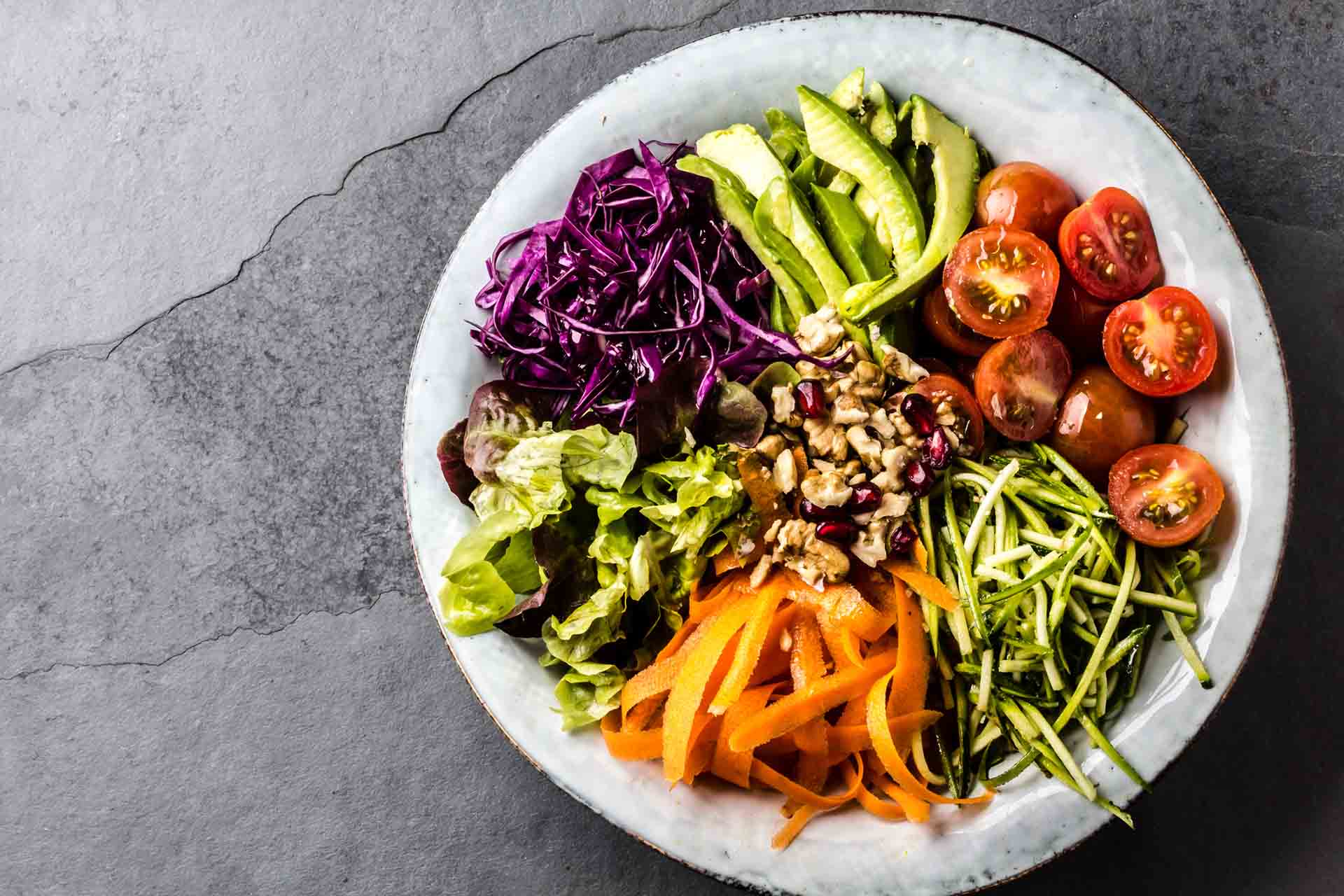BBQ Sauces Ranked: Which Ones Complement Plant-Based Meals Best?
BBQ Sauces Ranked: Which Ones Complement Plant-Based Meals Best?
Blog Article
All About Healthy And Balanced Food: Advantages of Checking Out Plant Based Alternatives
The conversation surrounding plant-based diet regimens has acquired considerable focus in the last few years. Numerous people are discovering the potential wellness advantages, dietary advantages, and ecological impacts connected with these nutritional options. As people end up being more knowledgeable about their food's influence on wellness and sustainability, inquiries arise about the usefulness of adopting such a lifestyle. What details adjustments can one anticipate, and just how might these options reshape not just individual health but additionally the world's future?
Recognizing Plant-Based Diet Plans
Many individuals connect plant-based diets mostly with vegetarianism or veganism, these diet plans can encompass a vast variety of consuming patterns that prioritize entire, minimally refined plant foods. Such diet plans frequently consist of fruits, veggies, whole grains, nuts, seeds, and beans, while getting rid of or limiting pet products. This versatility allows people to tailor their nutritional choices according to dietary demands and personal preferences. Some may take on a primarily plant-based diet regimen while still occasionally consuming meat or dairy products, often referred to as a flexitarian strategy. The focus stays on including more plant foods, which can result in a varied selection of meals and flavors. Recognizing these various interpretations of plant-based consuming is necessary for appreciating its availability and allure in contemporary food society.
Health Advantages of Plant-Based Foods
The health and wellness benefits of plant-based foods are substantial, using a nutrient thickness benefit that sustains total health. Research indicates that these foods can improve heart wellness and play a vital role in efficient weight administration. By incorporating extra plant-based alternatives, people might boost their dietary options and promote long-lasting health and wellness.
Nutrient Density Advantage
Nutrient density plays a vital duty in the health advantages of plant-based foods, making them an engaging option for those looking for a well balanced diet. Plant-based foods, such as fruits, vegetables, legumes, nuts, and whole grains, are frequently rich in vital vitamins, minerals, and antioxidants while being lower in calories. This high nutrient density allows people to eat less calories while still satisfying their nutritional demands. Additionally, these foods are packed with dietary fiber, promoting gastrointestinal health and aiding in weight management. By including nutrient-dense plant-based alternatives, consumers can improve their overall health, sustain their immune systems, and minimize the risk of persistent illness. Ultimately, the nutrient thickness of plant-based foods highlights their significance in a health-conscious lifestyle.
Heart Health Renovation
:max_bytes(150000):strip_icc()/45259671-97112006e572444a996dbbacfd4b8bed.jpg)
Weight Management Assistance
Along with promoting heart health, a plant-based diet can substantially help in weight management. This dietary technique highlights entire foods such as fruits, vegetables, beans, nuts, and entire grains, which are generally reduced in calories and higher in fiber contrasted to animal-based products. The high fiber material helps boost satiety, reducing general calorie intake. Plant-based diets are usually rich in necessary nutrients while reduced in undesirable fats, making it easier to preserve a healthy and balanced weight. Study shows that individuals that take on a plant-based lifestyle tend to have reduced body mass indexes (BMIs) and experience more effective weight reduction contrasted to those who eat meat-heavy diets. Accepting plant-based alternatives is a strategic option for efficient weight management.
Nutritional Value of Plant-Based Active Ingredients
Plant-based active ingredients are rich in vital nutrients, using a varied array of vitamins, minerals, and antioxidants that add to overall wellness. A comparison of protein sources reveals that while animal items are usually deemed superior, numerous plant-based choices give ample healthy protein and various other valuable substances. Understanding the nutritional value of these ingredients can assist people make educated nutritional options.
Necessary Nutrients in Plants
Nutrient-rich ingredients discovered in plants provide a diverse array of important nutrients that add substantially to total wellness. These components are rich in vitamins A, C, and K, which sustain immune feature, vision, and blood clotting, respectively. In addition, plants give crucial minerals such as magnesium, potassium, and calcium, crucial for heart wellness, muscle mass function, and bone toughness. The existence of fiber in plant-based foods aids food digestion and advertises a healthy and balanced digestive tract microbiome. Antioxidants, discovered abundantly in vegetables and fruits, aid battle oxidative stress and lower inflammation. Furthermore, numerous plant foods are low in calories yet high in nutrients, making them a superb option for those looking for to preserve a healthy and balanced weight while making sure optimal nutrient consumption.
Contrasting Protein Resources
Protein resources vary substantially in their dietary profiles, with plant-based active ingredients offering unique advantages. Unlike pet healthy proteins, which typically have hydrogenated fats and cholesterol, plant healthy proteins have a tendency to be lower in these harmful parts. Legumes, nuts, seeds, and entire grains are rich in important amino acids, fiber, vitamins, and minerals. Lentils supply high protein content alongside substantial iron and folate, while quinoa is a total protein, supplying all nine important amino acids. Furthermore, plant-based healthy proteins are frequently gone along with by anti-oxidants and phytochemicals that sustain overall wellness. The change to plant-based protein sources not only enhances dietary consumption however likewise aligns with lasting dietary techniques, decreasing ecological effect and promoting lasting health benefits.
Environmental Effect of Plant-Based Consuming
As understanding of environment adjustment expands, many people are exploring sustainable dietary selections that can significantly decrease their environmental impact. Plant-based consuming has emerged as a substantial contributor to lowering greenhouse gas discharges, which are primarily linked with livestock manufacturing. The farming of fruits, vegetables, grains, and veggies usually requires fewer resources, such as water and land, contrasted to pet farming. Additionally, plant-based diet regimens can lead to decreased deforestation, as much less land is needed for grazing animals or expanding animal feed. By shifting towards plant-based alternatives, consumers can sustain biodiversity and advertise much healthier ecosystems. Generally, embracing plant-based eating not only benefits personal health but also stands for an important action towards ecological sustainability and conservation efforts.
Overcoming Common Misconceptions
While numerous people acknowledge the advantages of a plant-based diet plan, a number of misconceptions typically prevent them from totally welcoming this way of life. A typical idea is that plant-based diet plans lack adequate protein; nevertheless, many plant sources, such as vegetables, nuts, and tofu, offer sufficient healthy protein. Furthermore, some presume that this diet regimen is costly, when in fact, staples like beans, rice, and seasonal vegetables can be quite affordable. One more misconception is that plant-based consuming is excessively limiting, whereas it actually provides a diverse variety of foods and tastes. Ultimately, lots of fret that a plant-based diet might bring about shortages, yet with correct planning, people can get all necessary nutrients, consisting of vitamins and minerals, while delighting in a large range of tasty meals.
Tips for Transitioning to a Plant-Based Lifestyle
Making the change to a plant-based lifestyle can be an improving experience, though it usually requires some support to navigate the first adjustments. Individuals are urged to start slowly, including even more fruits, veggies, beans, and whole grains right into their dishes while minimizing meat and milk intake. Meal preparation is important; preparing a regular menu can assist alleviate the modification and avoid last-minute undesirable choices. Checking out cooking approaches and brand-new dishes can additionally keep and enhance the experience excitement regarding plant-based consuming. Additionally, signing up with support system or areas can give motivation and share important tips. Remaining notified about nourishment warranties balanced meals, protecting against shortages while promoting a healthy, gratifying plant-based lifestyle.

Delicious Plant-Based Dish Ideas
Exploring delicious plant-based meal ideas can motivate individuals to embrace a much more his comment is here nourishing diet regimen. One prominent option is a hearty quinoa salad, featuring cherry tomatoes, cucumber, and a vibrant lemon-tahini clothing. One more favorite is a tasty lentil stew, loaded with carrots, celery, and great smelling herbs, ideal for a comforting dinner. For morning meal, overnight oats made with almond milk, chia seeds, and covered with fresh berries give a nutritious start to the day. Additionally, a dynamic vegetable stir-fry with tofu and a range of vivid veggies can be a quick yet satisfying dish. Finally, luscious avocado toast on whole-grain bread, sprinkled with seeds and spices, uses a basic yet flavorful snack. These dishes display the variety and splendor of plant-based consuming.

Regularly Asked Inquiries
Can a Plant-Based Diet Regimen Provide Sufficient Healthy Protein?
The concern of whether a plant-based diet plan can provide enough healthy protein prevails. Many sources, consisting of legumes, nuts, seeds, and whole grains, can fulfill protein requires Extra resources successfully, supporting a balanced and healthy diet for individuals.
Are Plant-Based Diet Plans Suitable for Children?
The suitability of plant-based diet regimens for kids depends upon careful preparation. Adequate nutrients must be ensured, consisting of minerals, healthy proteins, and vitamins. With correct advice, such diet regimens can support healthy development and development in youngsters.
How Do I Eat Out on a Plant-Based Diet?
Eating in restaurants on a plant-based diet regimen entails seeking restaurants with varied food selections, requesting alterations, and discovering vegan-friendly alternatives. Planning ahead and interacting nutritional choices can boost the dining experience while keeping nutritional choices.
What Are Usual Allergens in Plant-Based Foods?
Common irritants in plant-based foods include soy, gluten, nuts, and seeds - Plant Based Chicken. Individuals following a plant-based diet plan ought to be conscious of these irritants and check out labels carefully to stay clear of unfavorable responses and guarantee secure intake
Can Plant-Based Diets Aid With Weight-loss?
Research study indicates that taking on a plant-based diet regimen may promote weight reduction click here now due to its usually lower calorie density and higher fiber web content. This combination can boost satiation, helping individuals handle their caloric consumption efficiently. Lots of individuals connect plant-based diets primarily with vegetarianism or veganism, these diet regimens can incorporate a wide range of consuming patterns that prioritize entire, minimally refined plant foods. Nutrient density plays an essential function in the health advantages of plant-based foods, making them an engaging choice for those looking for a balanced diet regimen. Plant-based diets have actually been shown to markedly improve heart health and wellness, as they commonly have elements that sustain cardiovascular feature. In enhancement to advertising heart health and wellness, a plant-based diet plan can substantially assist in weight administration. An usual belief is that plant-based diet regimens lack sufficient healthy protein; nonetheless, many plant resources, such as vegetables, nuts, and tofu, provide enough healthy protein.
Report this page